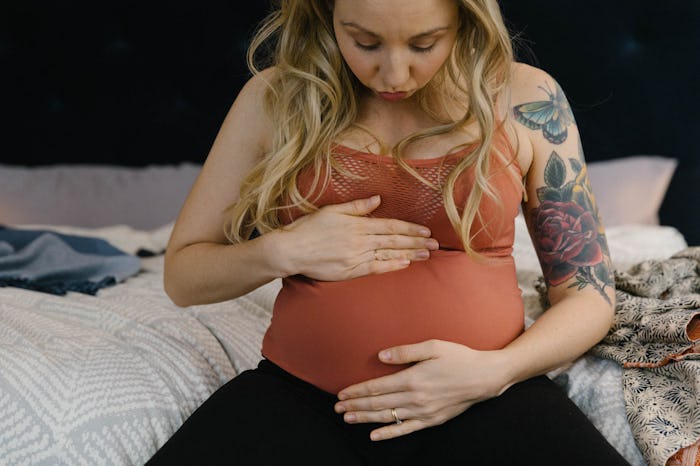Life
9 Ways To Deal With Constant Braxton Hicks, According To Experts
The last few weeks of my pregnancies felt like they lasted approximately 370 months. And my near-constant Braxton Hicks contractions? Yeah, those didn't help. For the uninitiated, "Braxton Hicks" is the official name for the “practice contractions” or "false labor" some people experience in pregnancy. I had them during all of my pregnancies, and I had no idea how a pregnant woman was supposed to deal with constant Braxton Hicks. I mean, they hurt!
I had no idea Braxton Hicks were a thing when I was pregnant with my first, and they were so bad they took my breath away. Because I was only 36-weeks along I went to the hospital in a panic, thinking I was in labor. And when the nurse hooked me up to the monitor, sure enough, I was having actual contractions. But after that same nurse checked my cervix I learned there's a different between contractions and real contractions. My body was just preparing for labor, but the "real deal" was still a few weeks away.
Just because Braxton Hicks contractions aren't "real" doesn't mean they don't really hurt, especially when they're constantly happening. Fortunately, for myself and pregnant women everywhere, there are a few ways cope and stay comfortable, which just so happen to include the following:
Stay Calm
I was terrified I'd have my baby early, and I was in a lot of pain, so staying calm when I had those first few Braxton Hicks contractions wasn't easy. But when I called my doctor they told me that the most important thing to try to do was stay calm. Easier said than done, doc.
As March of Dimes notes, stress — especially chronic stress — can cause labor contractions, due in part to your body producing labor-causing hormones too soon. Instead of panicking, which can totally make things worse, it's better to take a breath, get more information, and stay calm.
Put Your Feet Up
According to All About Women Obstetrics and Gynecology, Braxton Hicks contractions can be a normal part of pregnancy. However, they do tend to occur when people are doing too much, or are worn out after exercising, working, or even having an orgasm.
When you're pregnant it's super important to listen to what your body is trying to tell you, and temper your physical activity if you're experiencing constant Braxton Hicks contractions.
Drink Some Water
As BabyCenter notes, Braxton Hicks might also be your body's way of telling you that you need a drink... of water, that is. Since dehydration can cause Braxton Hicks contractions, drinking some water might help the false labor contractions subside. In fact, staying hydrated can prevent them from happening in the first place.
Take A Stroll
While exercise and exertion can cause Braxton Hicks, for some women it can also help calm them down. When I was pregnant with my first I found that going for a walk or bouncing on an exercise ball helped. Of course, the next time I was pregnant and experiencing Braxton Hicks the only thing that helped was laying down, which just goes to show that every pregnancy is different.
Take A Bath
In my opinion, the only way to feel remotely comfortable during the last two weeks of pregnancy is to take a warm bath. After checking with my OB-GYN to make sure I wasn't in labor and could safely soak, I took daily baths to relieve the oh-so-annoying pressure and pain that was Braxton Hicks.
Breathe
While BabyCenter notes that breathing won't generally stop your Braxton Hicks, it can help you relax and get some practice coping with contractions for when you actually go into labor. I found that meditation, yoga breathing, and trying to stay positive helped me stay focused on the goal of delivering a healthy baby, rather than freaking out about my Braxton Hicks.
Call Your Doctor
If you're having contractions before your baby has reached full-term or 37 weeks, you should definitely give your provider a call. BabyCenter notes that Braxton Hicks contractions might seem like the real thing, especially during your first pregnancy, and sometimes it's difficult to decipher between the two. So if you think you might be in preterm labor, you shouldn't hesitate to call your doctor for a second opinion on your contractions, especially if you have other symptoms like spotting, cramping, pressure, or back pain.
Pee Again
According to What to Expect, in addition to getting enough to drink, moms-to-be should make sure they pee often, because having a full bladder can irritate your uterus and cause Braxton Hicks contractions or even preterm labor.
Head To The Hospital
As someone who has been through both preterm labor and Braxton Hicks contractions, I can tell you that it's really hard to tell the difference.
Only a health care provider can tell if your constant contractions are actually productive labor contractions or just your uterus practicing for the labor to come. So even if you think you're experiencing Braxton Hicks, you should definitely head to the hospital and find out what's going on if they're constant, painful, or if you're just worried. After all, that's what your doctor is for.
